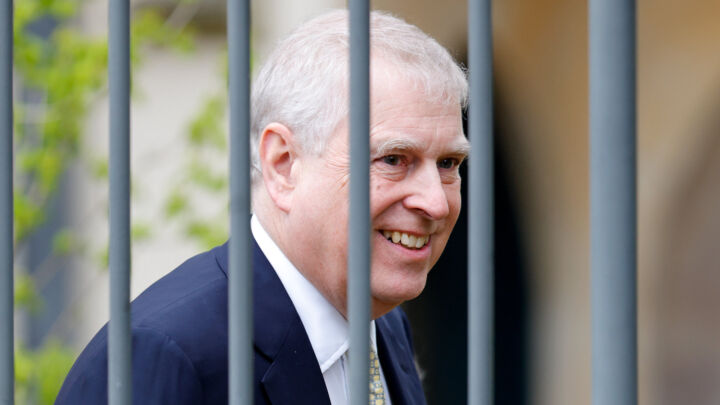‘There is a moral case for fossil fuels’
Alex Epstein tells spiked why we need to celebrate our impact on nature.

Want unlimited, ad-free access? Become a spiked supporter.
‘The moral case against fossil fuels is rooted in the standard that we should be minimising our impact. And the moral case for fossil fuels questions that at its root. It doesn’t just say these windmills are chopping off birds’ heads. It says that the whole standard, the whole metric by which we’re going to evaluate fossil fuels, is maximising human wellbeing. And when you adopt that standard, you see that there absolutely is a moral case for fossil fuels.’
Alex Epstein, founder of the Center for Industrial Progress and the author of a brilliant, bracing new book, The Moral Case for Fossil Fuels, makes for a passionate interviewee. He’s also got the facts to back up what, in today’s green-hued zeitgeist, appears to be an achingly unfashionable argument. But it’s true: if the moral standard by which you evaluate fossil-fuel usage is the betterment of human life, then fossil fuels are indisputably a moral good.
As Epstein points out in The Moral Case, ‘Today the world uses 39 per cent more oil, 107 per cent more coal, and 131 per cent more natural gas than it did in 1980’. And during that period, the basic measures of human wellbeing have shown marked improvements:
‘World life expectancy at birth has gone up from 63 in 1980 to 70 in 2012. The child mortality rate on the planet went down from 115 to 47 per 1,000 live births. Infant mortality declined from 80 to 35 per 1,000 live births in the same time period… Malnutrition, defined by the percentage of children under five with significantly below average weight or height for their age, has been constantly decreasing at a significant rate since 1990. Access to electricity and improved water sources, which are basic indicators for human wellbeing, hygiene, and health in general, went up as well. Developing countries in the sub-Saharan and East Asian region have been particularly impressive; East Asian developing countries now have an average life expectancy at birth of 73 years.There is much credit to be given to industrial-scale energy, primarily from fossil fuels.‘
But what’s so surprising about the correlation between our colllective ability to produce more and more energy – nearly 90 per cent of which is produced from fossil fuels – and the vast improvements in life expectancy, infant mortality, food provision and so on, is that energy production using fossil fuels has so few champions. A fog of defensiveness even hangs over the fossil-fuel sector itself. It’s as if no one can see what to Epstein is blindlngly clear: there is a positive, indeed moral, case to be made for these most unfairly maligned of human resources. They have, in Epstein’s words, allowed humanity to flourish, that is, to enlarge our capacity to pursue our desires.
As Epstein explains, both sides of the climate-change debate, be they alarmist or sceptical, share the same assumption – that the so-called human footprint is a problem. ‘The issue has been framed as “how much are we impacting climate?”. If you look on a conservative website, for instance, you’ll see a section on climate. And, for me, this makes as little sense as if you had a medical website with section called “vaccine side effects”… The green movement has completely framed the issue with the goal being to minimise our impact on climate, hence a lot of conservatives have countered with a defensive “well, we’re not actually doing that much”.’ So, rather than point out, as Epstein puts it, that ‘the burning of ancient dead plants is an unbelievably positive process’, too many are content to say that fossil-fuel use isn’t that negative.
It’s not always been that way, of course. The Moral Case usefully recalls the perspective of those enthused by the transformative potential, the capacity to create and flourish, unleashed by the Industrial Revolution. In 1865, the economist William Stanley Jevons wrote: ‘With coal almost any feat is possible or easy; without it we are thrown back into the laborious poverty of earlier times.’ And if the coal ran out, he wondered? ‘We [should] miss our grand dependence, as a man misses his companion, his fortune, or a limb, every hour and at every turn [is] reminded of the irreparable loss.’ It wasn’t as if the environmental harms, as today’s green argot has it, were yet to be recognised. ‘Pollution was visible as the smoke dampened the sunlight in the cities, darkened the laundry hanging to dry, and even blackened the trees with soot’, writes Epstein. ‘Still, the energy from coal was so valuable that these side effects were more than tolerated. In many cases, they were embraced. Take Manchester, England, a major industrial city full of coal waste. There was no movement against air pollution in Manchester – even though its pollution makes China’s air today seem pristine. Why not? Because, as one commentator put it, the smoke was an “inevitable and innocuous accompaniment of the meritorious act of manufacturing”.’
Today, however, things are different. What was once grasped as an ‘innocuous’ by-product of fossil-fuel useage, to be ameliorated with better technology, has become the all-consuming focus of any discussion of how best to produce energy. It’s all about the side effects. We’re not encouraged to look at what ever-improving energy production can do for us, how it can liberate and empower us. No, we’re urged to look at what it can do to the planet, how it can enslave and damage nature. This worldview, this nature- rather than human-centred morality, dominates political and cultural life today. It allows the likes of environmentalist Bill McKibben to declare in Rolling Stone magazine that the fossil-fuel industry is ‘Public Enemy Number One’ and call for a mass-movement to demonise it and deprive it of political standing, ‘much as South Africa’s Apartheid regime had been demonised and dismantled due to the moral outrage of private citizens around the world’.
On this nature-centric ideology, Epstein is particularly cutting. He says ‘we’re taught to think that Planet Earth, nature, is something superior to human beings and that we’re to serve it by refraining from impacting it, or transforming it, or altering it in any way’. He calls this ‘the fragile-mother view of nature’: ‘It’s as if this Garden of Eden is giving us what we need, but it exists in this delicate balance, so we need to tread lightly, and make no impact.’ But, says Epstein, ‘this Disney-esque view of the planet is false. The planet has unbelievable potential, but, in its unaltered state, it is resource-poor, and very threat-rich. So man’s primary activity on the planet is to transform it to meet his needs.’
This is key to countering the humans-are-bad-for-nature sentiment, the conviction that we need to minimise our impact on the planet. Not only, Epstein tells me, are we part of nature, we’re ‘the best part’. Impacting on the natural world, transforming and altering it, is a ‘moral enterprise’. It is part of the perpetual struggle to forge a world capable of meeting our ever-developing needs. Humanity is ‘unnatural’, if by that it is meant we are constantly freeing ourselves from natural necessity – and that’s a good thing. As Epstein notes, this means that a newborn child, who may once have died of ‘natural causes’, will survive thanks to an incubator – a human invention that requires a reliable source of energy. And it’s not just incubators, of course. All around us are machines and technologies that allow us to do remarkable and literally death-defying things, machines and technologies that free us from nature’s thrall. And energy, or ‘machine calories’, is crucial to this development and flourishing.
Certain environmentalist fetishes need exposing here. Nature is not benevolent; it’s indifferent. It’s only through human activity, through maximising our impact, that we turn it from something for itself, into something for us – that is, we humanise it. And this goes for the climate itself. ‘We don’t take a safe climate and make it dangerous’, writes Epstein. ‘We take a dangerous climate and make it safe. High-energy civilisation, not climate, is the driver of climate livability. No matter what, climate will always be naturally hazardous – and the key question will always be whether we have the adaptability to handle it or, better yet, master it.’ Such mastery won’t be achieved through minimising our impact on nature, through genuflecting towards some fantastical Mother Earth. Rather, it requires a desire to increase humanity’s impact, to develop its footprint. Epstein writes, ‘Development is the transformation of a nonhuman environment into a human-friendly environment using high-energy machines. Development means water-purification systems, irrigation, synthetic fertilisers and pesticides, genetically improved crops, dams, seawalls, heating, air-conditioning, sturdy homes, drained swamps, central power stations, vaccination, pharmaceuticals, and so on.’
All of which sounds wonderful. ‘But what of the science?’, Epstein’s critics would say. What of the experts telling us that humanity, through its increasing use of fossil fuels, is impacting on nature, and the climate in particular, to a catastrophic extent? Epstein’s retort is simple – déjà-vu. In the 1970s and 1980s for instance, there was no shortage of similar doomsaying. ‘If I were a gambler, I would take even money that England will not exist in the year 2000’, wagered prominent ecologist Paul R Ehrlich. In 1986, NASA’s James Hansen said that because of the ‘greenhouse effect’, global temperatures would rise early in the next century to ‘well above any level experienced in the past 100,000 years’. And so on and so on.
‘It’s important that people know the track record [of climate-change alarmism]’, Epstein tells me. ‘It’s not even that it’s not mentioned. It’s that it gets mythologised as accurate. So James Hansen recently published a so-called study, and it was about these dramatic rises in sea levels. And the journal described Hansen as the guy who has been most correct on climate change. But here’s the thing: any normal person who did not predict a climate catastrophe would have a far better track record on this issue than James Hansen. He predicted this incredibly dramatic, runaway global warming and there was none.’
Indeed, as The Moral Case explains: ‘Since the Industrial Revolution, we’ve increased CO2 in the atmosphere from 0.03 per cent to 0.04 per cent, and temperatures have gone up less than a degree Celsius, a rate of increase that has occurred at many points in history. Few deny that during the past 15-plus years, the time of record and accelerating emissions, there has been little-to-no warming – and the models failed to predict that.’
Pointedly, Epstein is worried not only about the rectitude of the so-called science, but the elevation of The Science as a source of implacable authority. It’s as if it’s enough for those adhering to the minimise-human-impact, nature-centric worldview merely to invoke The Science to win the debate. The Science tells us that we must reduce CO2 emissions; The Science tells us we must reduce energy consumption; The Science tells us we have to fly less; The Science tells us to jump off a bridge… Epstein is unmoved. ‘Any given science cannot tell you how to act’, he says, mentioning the fact he himself trained to be a scientist when younger. ‘Science can only really give you information, not instruction. We have a very religous-dogmatic approach to science, which has a long history, exploiting science’s deserved prestige for its legitimate accomplishments. Hence dictators and charlatans always want to call what they do “science”. So as soon as you hear someone say “you should do X because The Science with a capital S says so”, you’ve got to start questioning it – or start running.’
Epstein continues: ‘To say “I want a scientist to tell me what to do” is absurd. It’s not as though Isaac Newton could tell you what house to get. Yeah, some of his knowledge could be relevant to that – certain physical laws. But he was not an oracle. No, it’s legitimate to want to be informed by science [but not to be told what to do by science]. The place of the scientist in our culture needs to be re-evaluated.’
Which, in a sense, is part of the purpose of The Moral Case for Fossil Fuels. Epstein is reframing the entire debate about climate change and energy. He is taking it out of the hands of The Science, and countering the nature-centric presuppositions of the debate, in which the objective is to reduce humanity’s impact on nature. It’s a deeply humanist move, and one for which he deserves the last word: ‘The moral case for fossil fuels is not about fossil fuels; it’s the moral case for using cheap, plentiful, reliable energy to amplify our abilities to make the world a better place – a better place for human beings.’
Tim Black is deputy editor at spiked.
The moral case for Fossil Fuels, by Alex Epstein, is published by Penguin. (Order this book from Amazon(UK).)
You’ve hit your monthly free article limit.
Support spiked and get unlimited access.
Support spiked and get unlimited access
spiked is funded by readers like you. Only 0.1% of regular readers currently support us. If just 1% did, we could grow our team and step up the fight for free speech and democracy.
Become a spiked supporter and enjoy unlimited, ad-free access, bonus content and exclusive events – while helping to keep independent journalism alive.
Monthly support makes the biggest difference. Thank you.











Comments
Want to join the conversation?
Only spiked supporters and patrons, who donate regularly to us, can comment on our articles.